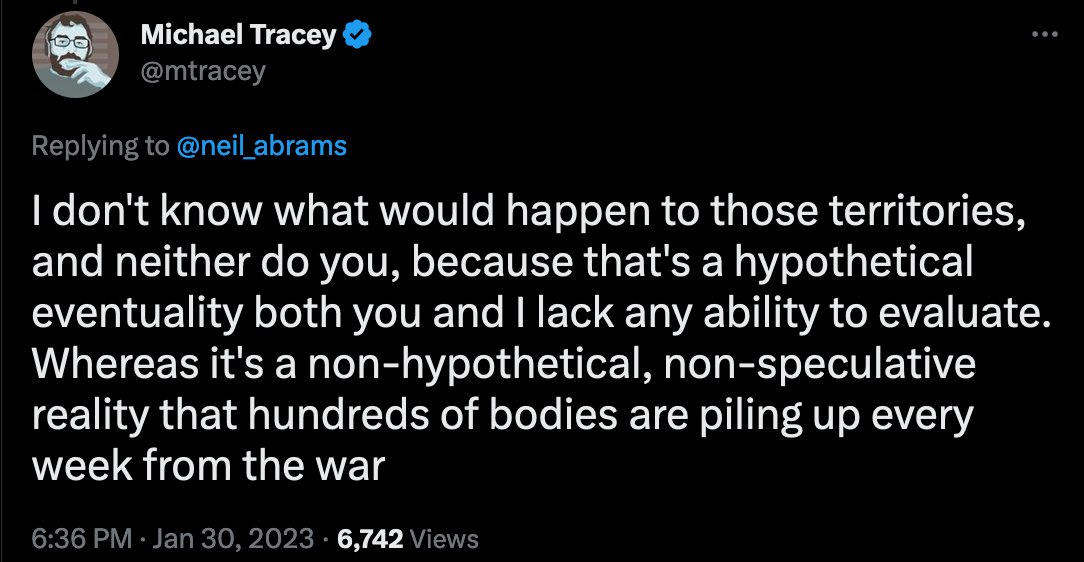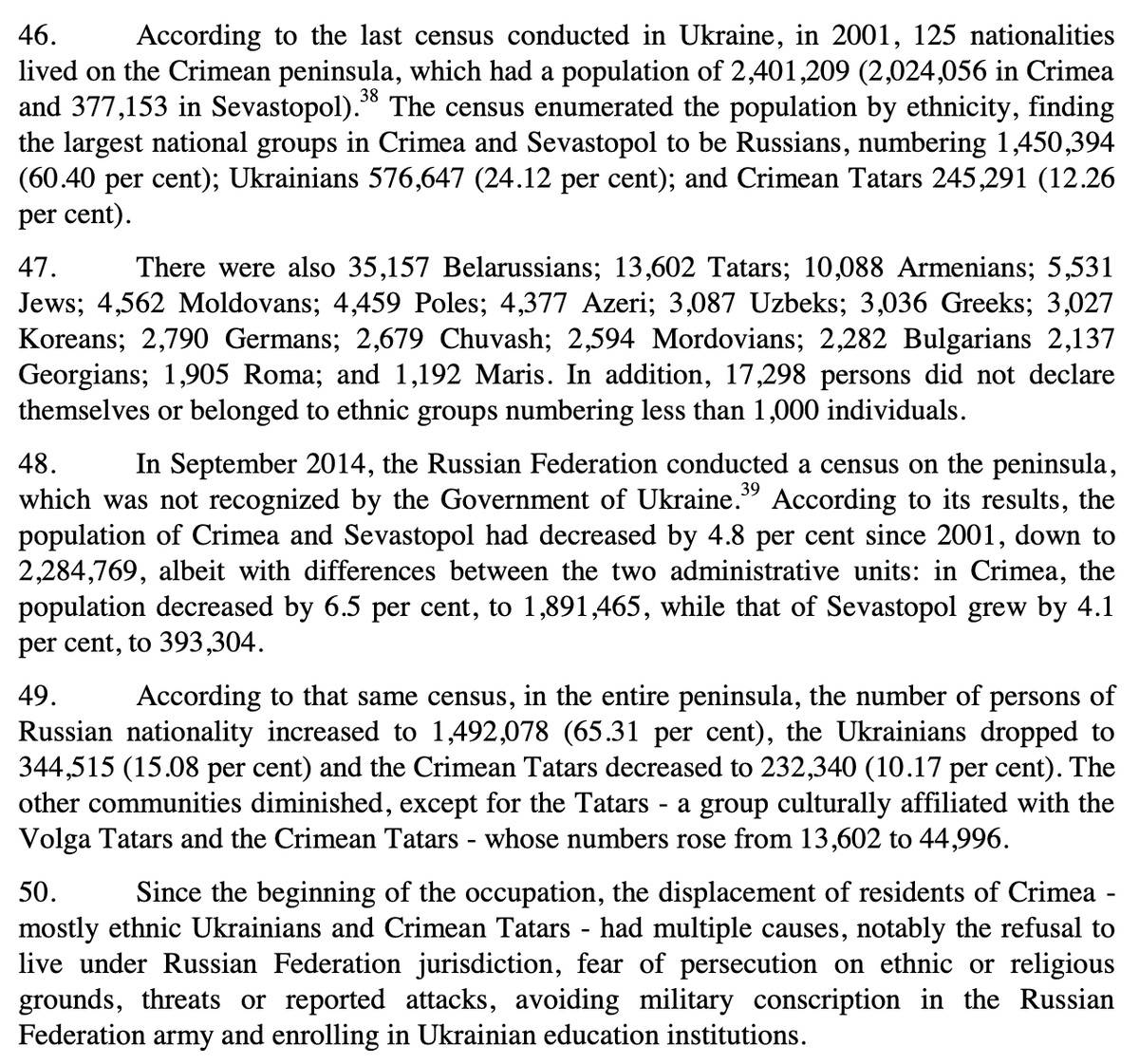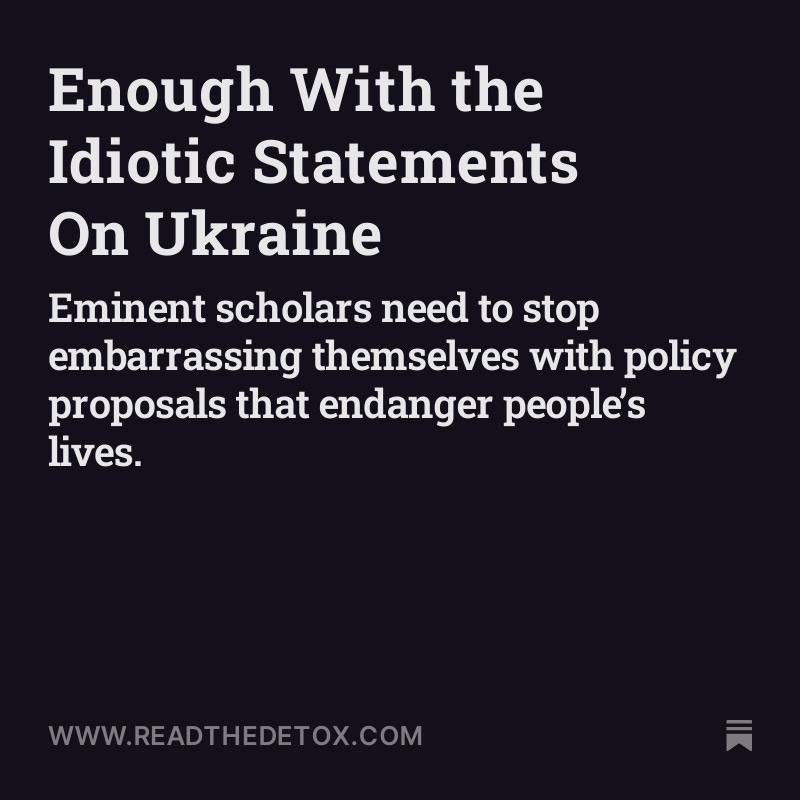Anyone who insists the West stop arming Ukraine or force it to negotiate a peace agreement against its will is, wittingly or not, endorsing mass death and other human rights abuses.
How do we know? Russia’s own recent history tells us so.
A thread:
How do we know? Russia’s own recent history tells us so.
A thread:
As you’re undoubtedly aware, ever since Russia commenced its 2022 invasion a large community of ostensible leftists, not to mention bad-faith rightwing actors, have been urging “negotiations” toward a “peace agreement.”
According to this view, the West, by providing Ukraine with weapons instead of compelling it to negotiate a peace settlement, is prolonging and escalating the war.
Those calling for “peace” see this as a war between two countries which share culpability and could hash things out if only they negotiated in good faith. In truth, it’s an invasion aimed at colonial conquest. And a brutal colonial conquest is exactly what “peace” would entail.
I’ve previously made my contempt for these people quite clear. Their calls to disarm Ukraine and force negotiations seemingly betray a childlike naïveté about Russia’s aims and conduct. It’s “you can’t hug a person with lethal arms,” only dressed up in adult-sounding language.
Only most of those urging disarmament and “peace” are not naïve. They are, in fact, well-aware of the obvious counterargument: That a negotiated “peace” would consign millions of Ukrainians to genocide. Still, for whatever reason, they persist with their concern-trolling.
So for brevity’s sake I’m going to assign these people a label: peace-trollers. A peace-troller, in the context of Russia’s war on Ukraine, is someone who disingenuously calls for “peace” in order to deflect from an honest discussion of the conflict.
As you probably know, peace-trollers like to argue that NATO provoked Russia to invade. This argument is flatly contradicted by Russia’s own behavior as well as the statements of its state media, key officials, and Vladimir Putin himself. Receipts:
https://twitter.com/neil_abrams/status/1570879952677113856?s=20&t=s8A4FeOyYqxNsDkN7Vf6ww
If, after seeing the evidence in the above thread, you still think Russia can be satisfied merely by a Western guarantee against further NATO expansion as opposed to the acquisition of vast Ukrainian lands, I really don’t know what to tell you.
Still, peace-trollers retort, even if Russia seeks territorial conquest, there’s no reason to think Ukrainians who get annexed by Russia would fare worse than they do now, right?
Actually, there’s every reason to think so—which probably explains why Ukrainians continue to fight.
Actually, there’s every reason to think so—which probably explains why Ukrainians continue to fight.

This brings us to another refrain by peace-trollers, whose incessant condemnations of lethal aid to Ukraine are often based on the (very stupid) presumption that the West is somehow forcing Ukrainians to fight and die against their will. 







Upon learning my spouse is Mexican, a mom, jubilant over her toddler’s newfound enthusiasm for Legos, once asked me: “Do they have Legos in Mexico?”
Yes, Becky, they have Legos in Mexico—just like they have OPINION POLLS IN UKRAINE.
Yes, Becky, they have Legos in Mexico—just like they have OPINION POLLS IN UKRAINE.
For the record, nobody is *making* Ukrainians defend their country against Russian aggression.
Survey evidence shows Ukrainians overwhelmingly reject a land-for-peace deal with Russia, a view which holds across all regions and linguistic categories. kiis.com.ua/?lang=eng&cat=…


Survey evidence shows Ukrainians overwhelmingly reject a land-for-peace deal with Russia, a view which holds across all regions and linguistic categories. kiis.com.ua/?lang=eng&cat=…



So let’s set the record straight and see exactly what Russia has in store for any Ukrainian territories it acquires as a result of a “peace deal.”
Below is a brief survey of the appalling abuses that have followed Russia’s various post-Soviet conquests.
Below is a brief survey of the appalling abuses that have followed Russia’s various post-Soviet conquests.
For simplicity’s sake, I’m keeping this discussion restricted to the post-Soviet period—even though one could easily include the horrendous crimes carried out by the Soviets and the Tsars.
And one more thing: Lest you feel tempted to try and what-about me by bringing up America’s own history of terrible crimes, just save it. Yeah, I know all about that shit and condemn it in the most forceful terms. So stop acting like it somehow excuses Russia’s conduct.
With that out of the way, let’s get to it. The first stop on our tour of Russian horrors is the former breakaway province of Chechnya. 

Chechnya has a long history of repression and rebellion stretching back to the Tsarist period. The Soviets deported the entire population in 1944 only to allow them to return in 1957. After the Soviet collapse, Chechens fought a war for independence from the Russian Federation.
The war lasted from 1994-96 and ended with an interim peace deal. In 1999, Russia, now led by Putin as P.M., invaded Chechnya again. By mid-2000, it had managed to largely pacify the province
But the key question for Ukraine is: What happened next, after “peace” was restored?
But the key question for Ukraine is: What happened next, after “peace” was restored?
Since 2005, the European Court of Human Rights has decided 499 suits brought by Chechen civilians against Russia for the latter’s human rights abuses, practically all of which occurred *after* the end of major military operations in mid-2000. srji.org/en/legal/cases…
This 2015 report by the International Crisis Group details Russia’s record of unrestrained violence and savage repression against the Chechen population since the end of the war. crisisgroup.org/europe-central… 







For those who want to dig deeper, Emma Gilligan, a professor at Indiana University Bloomington, has written what is perhaps the definitive account of Russian crimes in Chechnya both during and after the end of active hostilities. degruyter.com/document/doi/1…
Chechnya is hardly the only example of crimes against humanity committed by post-Soviet Russia in the aftermath of war. In 2008, Russia launched an offensive against Georgia which, in 16 short days, managed to establish a Russian proxy state in the region of South Ossetia. 

Back in 1991, when the USSR was collapsing, South Ossetia declared independence from what was then the Soviet republic of Georgia, sparking a civil war marked by ethnic cleansing on both sides. 

Georgia might have successfully defeated the rebellion had it not been for the intervention of a Russian “peacekeeping” force, which in 1992 helped establish South Ossetia as a de facto independent state inside a now-independent Georgia.
Later, in 2008, Russia invaded Georgia a second time. This new invasion would see Russia temporarily occupy parts of Georgia proper and permanently occupy South Ossetia. Since that time, Russia has annexed South Ossetia in all but name.
But most relevant for Ukraine is what happened in South Ossetia after Russia’s military victory. Well, what happened was the violent ethnic cleansing of the local ethnic Georgian minority in addition to arbitrary detentions, torture, and other abuses. hrw.org/report/2009/01… 



The next example of Russia’s barbaric conduct as an occupying power is Crimea, the Ukrainian Black Sea peninsula which Russia invaded and annexed in 2014. I’ve provided some background on this event in previous threads:
https://twitter.com/neil_abrams/status/1583460843366162432?s=20&t=pWNnDfdD-LC4kePTPlWwxA
https://twitter.com/neil_abrams/status/1585657739979669506?s=20&t=-LwT399ctA8glBU3eroFQg
Crimea would endure the usual pattern of repression, intimidation, arbitrary detentions, torture, etc. It would also see the forced deportations of ethnic Ukrainians and Tatars and their replacement by hundreds of thousands of Russian immigrants: ohchr.org/sites/default/…
Here's a relevant portion of the OCHCR report linked to above on the demographic changes Russia forced upon Crimea in the wake of its 2014 invasion: 

Evidence of Russia’s atrocious human-rights abuses in Crimea since 2014 is not hard to find. Here’s a 2022 piece from the European Journal of International Law, complete with helpful links to formal reports by international rights organizations: ejiltalk.org/crimean-tatars…
Finally, I’d be remiss if I didn’t mention Syria. Although mostly known for Russia’s indiscriminate aerial bombings, it also witnessed on-the-ground rights abuses by Russian paramilitary group Wagner, the neo-Nazi outfit now present in Ukraine. timep.org/commentary/ana… 

In sum, Russia’s bloody and brutal record as an occupying power provides ample justification for Ukrainians to resist rather than submit to its domination. And it shows just how morally repugnant are peace-trollers’ calls for disarmament in service of a “peace agreement.”
If and when Ukrainians choose to conclude a peace deal with Russia, the rest of the world should heed their decision. But, for now, it should respect—and, yes, aid—their quest to fend off Russian subjugation. This isn’t hard, people, whatever peace-trollers want you to think.
/end
• • •
Missing some Tweet in this thread? You can try to
force a refresh



















